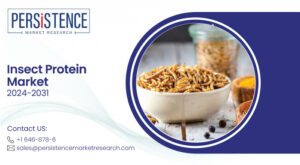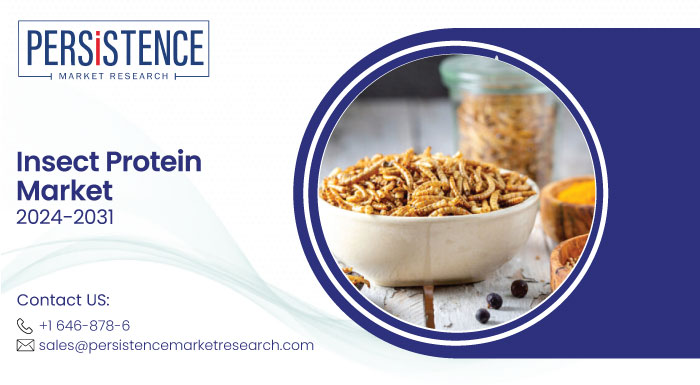In a world where sustainable food sources are rapidly gaining attention, insect protein has emerged as an unlikely hero. While insects have long been part of diets in various cultures worldwide, it’s only recently that their potential as a mainstream protein source has been recognized, especially in the context of environmental sustainability. As global concerns around climate change, resource scarcity, and food security intensify, insect protein presents a viable solution for reducing the environmental footprint of our food system.
Read More: https://www.persistencemarketresearch.com/market-research/insect-protein-market.asp
The Case for Insect Protein
Insects are gaining attention as a source of protein due to their impressive environmental advantages, nutritional profile, and growing versatility in food products. Unlike conventional livestock, which require large amounts of water, feed, and land, insects are incredibly efficient in converting feed into edible protein. Here’s why insect protein is emerging as a key player in the sustainable food revolution:

1. Environmental Benefits
One of the most compelling reasons for the growth of the insect protein market is its minimal environmental impact. As the demand for food continues to rise, the food industry is under increasing pressure to find solutions that reduce its carbon footprint and reliance on finite resources.
- Water Conservation: Insect farming requires far less water compared to traditional animal agriculture. For example, crickets need just 1,000 liters of water to produce 1 kilogram of protein, compared to the 15,000 liters required for beef production. This makes insect farming a highly water-efficient method of protein production.
- Lower Greenhouse Gas Emissions: Insects emit far fewer greenhouse gases, such as methane, than traditional livestock like cattle and sheep, making them a more sustainable choice in the fight against climate change.
- Land Use Efficiency: Insects can be farmed in smaller spaces, often using vertical farming techniques, making them an excellent choice for urban agriculture. Unlike cattle, which require vast areas of land for grazing, insects can thrive in confined, controlled environments.
2. Nutritional Value
Insect protein is not just a sustainable alternative but a nutritious one as well. Many edible insects are packed with high-quality protein, essential amino acids, and micronutrients, making them a healthy addition to diets worldwide.
- Protein Content: Some species of edible insects, such as crickets, contain up to 70% protein by weight, higher than many traditional meat sources. This makes them an excellent option for people seeking high-protein diets without the environmental toll of conventional animal farming.
- Vitamins and Minerals: Insects are also rich in vitamins like B12, iron, calcium, and magnesium—important nutrients that support overall health. These micronutrients are often missing in many plant-based diets, making insect protein a valuable supplement for well-rounded nutrition.
- Healthy Fats and Omega-3s: Many edible insects are rich in omega-3 fatty acids, which are beneficial for heart health. This makes insect protein a desirable option for people looking to improve their cardiovascular health while reducing their environmental impact.
3. Economic Potential
Beyond its environmental and nutritional advantages, insect protein also offers significant economic benefits. As the market grows, insect farming is becoming more viable from an economic standpoint. Here’s why:
- Efficient Feed Conversion: Insects are incredibly efficient at converting organic matter into protein. Crickets, for instance, require only 2 kg of feed to produce 1 kg of edible protein. This efficiency is far superior to traditional livestock, which require much larger amounts of feed to produce the same amount of protein.
- Local Production Opportunities: Insect farming can be done on a small scale and in local settings, which can help reduce transportation costs and create jobs in rural or urban areas. It also reduces the dependence on international supply chains, offering economic resilience.
- Waste-to-Protein: Many insect species can feed on organic waste, including food scraps, agricultural by-products, and even industrial waste. This ability to recycle waste into valuable protein makes insect farming a part of a circular food system, helping to reduce overall waste and contributing to a more sustainable economy.
Insect Protein Applications: Beyond the Plate
While the primary use of insect protein has been in food products, its potential stretches far beyond that. As the demand for sustainable solutions rises, insect protein is making its way into various industries, each capitalizing on its unique properties.
1. Food Products
The use of insect protein in food products is perhaps the most well-known and rapidly growing application. From protein bars to flour, insects like crickets and mealworms are being used as ingredients in a variety of foods:
- Protein Bars and Shakes: Cricket protein powder is increasingly being used in protein bars, shakes, and snacks. These products are marketed as sustainable alternatives to traditional meat-based protein bars, catering to eco-conscious consumers.
- Flours and Baked Goods: Insects can be processed into flour, which can be used in baking, pasta, and snacks. Cricket flour, for example, is being incorporated into gluten-free and high-protein products.
- Gourmet Dishes: Insect-based ingredients are even being used in gourmet cooking. High-end restaurants are experimenting with edible insects in dishes like cricket tacos or mealworm pasta, offering a unique and eco-friendly dining experience.
2. Animal Feed
Insects are not just for human consumption. They are also increasingly being used as a sustainable alternative to traditional animal feed:
- Pet Food: Insects like black soldier flies and crickets are being used in pet food products, providing a high-protein, eco-friendly alternative to meat-based products for dogs, cats, and even fish.
- Livestock Feed: Insects are also being used in animal feed for livestock, particularly poultry and fish. This provides a sustainable protein source for animals, reducing the environmental impact of conventional animal feed production.
3. Agriculture and Waste Management
Insects can also play a crucial role in agricultural waste management:
- Waste Recycling: Insects, particularly black soldier flies, can consume organic waste such as food scraps and agricultural by-products, converting it into high-quality protein. This ability to transform waste into valuable resources makes insect farming an important part of circular food systems.
- Soil Fertilizer: Insect larvae also produce frass (insect manure), which is an excellent organic fertilizer. This adds further value to insect farming, as it provides a sustainable alternative to chemical fertilizers, which can have negative environmental impacts.
Overcoming Challenges to Acceptance
While insect protein offers numerous benefits, it still faces hurdles in mainstream adoption, particularly in Western markets where insect consumption is not common. However, with growing awareness of its environmental and nutritional advantages, the industry is making strides toward overcoming these challenges.
- Consumer Education: One of the biggest barriers to widespread acceptance is simply the unfamiliarity of insect-based products. Educational campaigns focusing on the sustainability and health benefits of insect protein are helping to change consumer perceptions.
- Product Innovation: Many companies are developing insect-based products that mask the insect origins, making them more palatable to a broader audience. For example, cricket protein is used in protein bars where the taste and texture are not overtly insect-like, easing the transition for hesitant consumers.
The Future of Insect Protein
The future of insect protein is bright, with the market expected to expand rapidly in the coming years. As consumer demand for sustainable food products rises, and as the technology behind insect farming advances, insect protein will likely become an integral part of the global food system. Its ability to address major sustainability challenges—like water scarcity, waste management, and the environmental cost of traditional animal farming—positions it as a key solution to feeding the planet in an environmentally responsible way.
Insects may be small, but their impact on sustainability is anything but. As innovation in the insect protein sector continues, these tiny creatures are set to revolutionize the way we think about food, waste, and the environment.
Incorporating insect protein into our food systems not only helps address some of the most pressing issues of today’s world, but it also presents a unique opportunity to build a more sustainable and resilient food future for generations to come.



